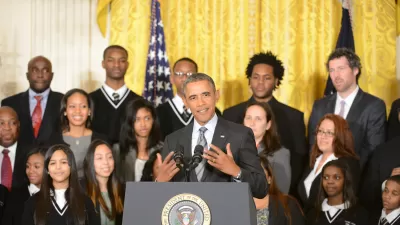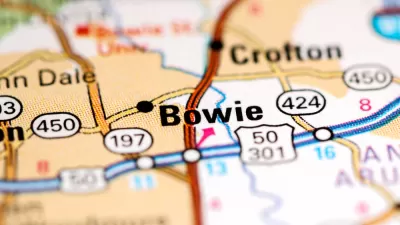Many have commented that for a President with a strong urban background and constituency, Barack Obama has given scant attention to urban issues. Will a new program announced today change that narrative?
"At a high school near his own neighborhood [in Chicago], President Obama on Friday will provide new details about an initiative to select 20 communities nationwide as laboratories for better coordination of federal, local, nonprofit and private-sector investments to revitalize long-distressed areas, according to administration officials."
One of the President's “ladders of opportunity” initiatives, which are designed to help more Americans reach the middle class, the 'Promise Zone' program would marshal resources from the departments of education, commerce, agriculture, justice and housing and urban development to assist local leaders in turning around areas with "problems like high and persistent unemployment, low rates of high school graduation and college attendance, high crime levels and residents’ health problems," reports Jackie Calmes.
“'The premise behind this is that the federal government has to be a positive actor in all of this effort — but as an actor who’s a partner,' said Cecilia Muñoz, director of the White House Domestic Policy Council. 'This has to be driven locally,' Ms. Muñoz added, with the federal government as 'a catalyst for change.'”
"As an example of how it would work, [administration officials] suggested that federal programs, local agencies and nonprofit organizations and private investors might team up in a zone to redesign a troubled area," explains Calmes. "Decrepit public housing, for instance, might be replaced with mixed developments for low- and moderate-income residents, with plans that involve education opportunities for preschool, after-school and summer instruction to reduce dropout rates; law enforcement grants for anti-crime measures, and job-skills training geared to local employers."
FULL STORY: Obama to Detail ‘Promise Zone’ Program to Aid Distressed Areas

Alabama: Trump Terminates Settlements for Black Communities Harmed By Raw Sewage
Trump deemed the landmark civil rights agreement “illegal DEI and environmental justice policy.”

Planetizen Federal Action Tracker
A weekly monitor of how Trump’s orders and actions are impacting planners and planning in America.

Why Should We Subsidize Public Transportation?
Many public transit agencies face financial stress due to rising costs, declining fare revenue, and declining subsidies. Transit advocates must provide a strong business case for increasing public transit funding.

Understanding Road Diets
An explainer from Momentum highlights the advantages of reducing vehicle lanes in favor of more bike, transit, and pedestrian infrastructure.

New California Law Regulates Warehouse Pollution
A new law tightens building and emissions regulations for large distribution warehouses to mitigate air pollution and traffic in surrounding communities.

Phoenix Announces Opening Date for Light Rail Extension
The South Central extension will connect South Phoenix to downtown and other major hubs starting on June 7.
Urban Design for Planners 1: Software Tools
This six-course series explores essential urban design concepts using open source software and equips planners with the tools they need to participate fully in the urban design process.
Planning for Universal Design
Learn the tools for implementing Universal Design in planning regulations.
Caltrans
Smith Gee Studio
Institute for Housing and Urban Development Studies (IHS)
City of Grandview
Harvard GSD Executive Education
Toledo-Lucas County Plan Commissions
Salt Lake City
NYU Wagner Graduate School of Public Service




























